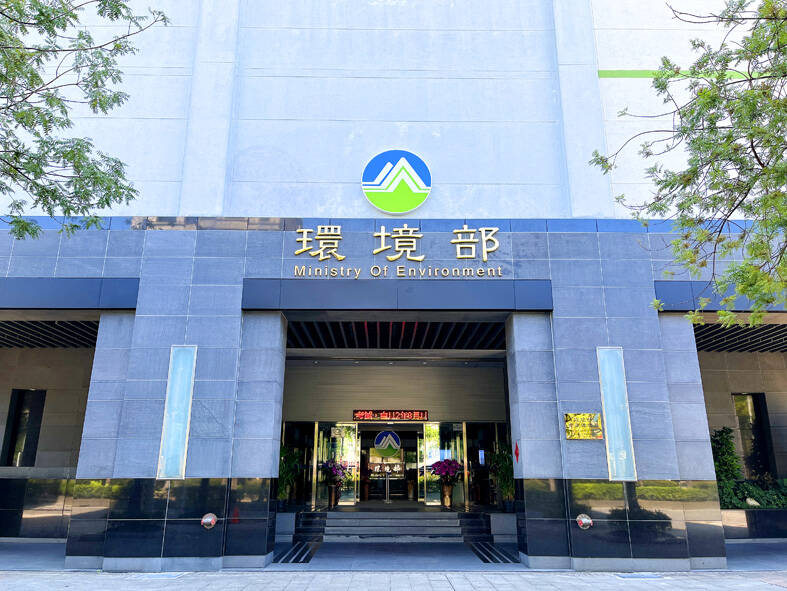The Ministry of Environment has released updated National Climate Change Action Guidelines, incorporating the goal of net zero emissions by 2050 and more details on key strategies first announced in March last year.
Following a revision of the Greenhouse Gas Reduction and Management Act (溫室氣體減量及管理法) into the Climate Change Response Act (氣候變遷因應法) earlier this year and the announcement of the net zero goal early last year, the ministry updated the guidelines and made the changes public on Thursday.
The revised guidelines retain the aim of the original, namely the need to construct a green and low carbon homeland that is able to adapt to climate risks and ensure the nation’s sustainable development.

Photo: Chen Chia-yi, Taipei Times
Also retained were the objectives to enhance the country’s adaptability and resilience against climate change, as well as reducing greenhouse gas emissions.
One key difference is that in 2017 the objective was the gradual reduction of greenhouse gas emissions to 50 percent of 2005 emissions level by 2050, while the latest version seeks to achieve net zero emissions by that year.
The guidelines also lay down general principles to be observed by the government.
The unchanged principles include complying with the Kigali Amendment to the Montreal Protocol, which calls for the gradual phasing-out of hydrofluorocarbons, and the Paris Agreement.
Others are transparency in policymaking, enhancing science-based climate change-adaptive capabilities, improving the efficiency of energy use, and emphasizing the partnership between the central and local governments, and their cooperation with non-governmental organizations and international actors.
The revised principles in the updated guidelines are those that follow the net zero 2050 transition plan from early last year.
The policy is based on energy, industrial, lifestyle and social transition, while two foundations are to be established to focus on upgrading technological research and development, and bolstering climate-related legislation.
The general principles in the revised guidelines also introduce the concept of justice in transition, highlighting the importance of generational and environmental justice.
The prioritization of the collection of carbon fees through a cap-and-trade scheme is another change, with implementation of a scheme having been “evaluated.”
The “nuclear-free homeland” goal remains in place, underlining that no expansion of nuclear power would be adopted as a means to combat climate change, but in the same sentence it also stresses the reliance on fossil fuel would be gradually lowered and renewable energy development goals introduced.
Policies for actual climate change mitigation have been outlined in greater detail and include identifying solar power and offshore wind power as mature renewable energy to be further developed and calling for the development of “forward-looking” geothermal, biomass and marine energy.
The construction of a supply and demand system for hydrogen was also highlighted in the updated mitigation policies.

WANG RELEASED: A police investigation showed that an organized crime group allegedly taught their clients how to pretend to be sick during medical exams Actor Darren Wang (王大陸) and 11 others were released on bail yesterday, after being questioned for allegedly dodging compulsory military service or forging documents to help others avoid serving. Wang, 33, was catapulted into stardom for his role in the coming-of-age film Our Times (我的少女時代). Lately, he has been focusing on developing his entertainment career in China. The New Taipei District Prosecutors’ Office last month began investigating an organized crime group that is allegedly helping men dodge compulsory military service using falsified documents. Police in New Taipei City Yonghe Precinct at the end of last month arrested the main suspect,

A cat named Mikan (蜜柑) has brought in revenue of more than NT$10 million (US$305,390) for the Kaohsiung MRT last year. Mikan, born on April 4, 2020, was a stray cat before being adopted by personnel of Kaohsiung MRT’s Ciaotou Sugar Refinery Station. Mikan was named after a Japanese term for mandarin orange due to his color and because he looks like an orange when curled up. He was named “station master” of Ciaotou Sugar Refinery Station in September 2020, and has since become famous. With Kaohsiung MRT’s branding, along with the release of a set of cultural and creative products, station master Mikan

LITTORAL REGIMENTS: The US Marine Corps is transitioning to an ‘island hopping’ strategy to counterattack Beijing’s area denial strategy The US Marine Corps (USMC) has introduced new anti-drone systems to bolster air defense in the Pacific island chain amid growing Chinese military influence in the region, The Telegraph reported on Sunday. The new Marine Air Defense Integrated System (MADIS) Mk 1 is being developed to counter “the growing menace of unmanned aerial systems,” it cited the Marine Corps as saying. China has constructed a powerful defense mechanism in the Pacific Ocean west of the first island chain by deploying weapons such as rockets, submarines and anti-ship missiles — which is part of its anti-access/area denial (A2/AD) strategy against adversaries — the

Eleven people, including actor Darren Wang (王大陸), were taken into custody today for questioning regarding the evasion of compulsory military service and document forgery, the New Taipei District Prosecutors’ Office said. Eight of the people, including Wang, are suspected of evading military service, while three are suspected of forging medical documents to assist them, the report said. They are all being questioned by police and would later be transferred to the prosecutors’ office for further investigation. Three men surnamed Lee (李), Chang (張) and Lin (林) are suspected of improperly assisting conscripts in changing their military classification from “stand-by